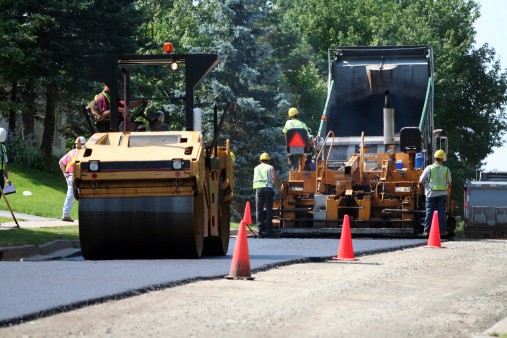Exploring the Numerous Sorts Of Asphalt Paving and Their Advantages
The landscape of asphalt paving includes a selection of types, each crafted to deal with details demands and ecological considerations. From the durable characteristics of Warm Mix Asphalt to the environmentally friendly features of Recycled Asphalt Pavement, comprehending these alternatives can considerably affect task results. In addition, developments such as Cozy Mix Asphalt and Porous Asphalt present additional layers of effectiveness and sustainability. As we explore these different paving options, the nuanced benefits they offer may shock you and possibly modify your approach to future paving jobs.
Hot Mix Asphalt
When thinking about the most efficient paving services, hot mix asphalt (HMA) stands apart as a leading option for lots of applications (paving service). HMA is a flexible leading material understood for its toughness, versatility, and general performance. It is produced by heating asphalt binder and combining it with accumulations at high temperature levels, making certain a consistent combination that can hold up against numerous ecological conditions
One of the primary benefits of HMA is its capacity to give a smooth, skid-resistant surface area, improving security for vehicles and pedestrians alike. Additionally, HMA shows superb resistance to contortion, making it optimal for high-traffic areas such as freeways and parking whole lots. Its versatility to different climates better adds to its extensive use.
The installment process of HMA is relatively fast, enabling for efficient task completion with minimal disturbance to traffic. Additionally, it can be reused, reducing waste and promoting sustainability within the construction industry. On the whole, warm mix asphalt remains a leading choice for leading professionals as a result of its robust efficiency qualities and lasting cost-effectiveness, making it a trustworthy service for numerous facilities demands
Warm Mix Asphalt
Cozy mix asphalt (WMA) offers an ingenious choice to hot mix asphalt, giving similar advantages while calling for lower manufacturing temperature levels. Usually generated at temperatures between 190 ° F and 250 ° F, WMA innovation minimizes energy intake and greenhouse gas emissions throughout production, making it a more eco-friendly option.
One of the key advantages of WMA is its extensive workability period. The lower temperatures permit extra efficient transportation and positioning, specifically in cooler weather. This versatility can cause boosted compaction and overall sturdiness of the asphalt surface area. In addition, WMA can be used in various applications, ranging from highways to property driveways, without jeopardizing efficiency.

The unification of ingredients or customized binders in WMA adds to its improved buildings, making certain that it fulfills or exceeds performance standards. WMA's minimized thermal effect throughout production can decrease the likelihood of damages to the surrounding setting, making it an appealing choice for lasting paving practices.
Cold Mix Asphalt
Cold mix asphalt is a flexible leading service generally utilized for short-lived repair work and low-traffic locations. This kind of asphalt is our website generated at ambient temperatures, making it a practical option for fast repairs and tasks where traditional hot mix asphalt might not be feasible. The blend typically contains asphalt binder, accumulation, and ingredients, permitting it to remain practical for an extended duration.
One of the key advantages of cold mix asphalt is its convenience of application. It can be installed without customized equipment, making it easily accessible for smaller sized professionals and DIY fanatics. Additionally, chilly mix can be used in numerous weather conditions, which is especially useful for immediate repair needs.

It might not supply the exact same long-term durability as warm mix asphalt, its quick application and adaptability make it a superb option for short-term remedies and low-traffic applications. Generally, chilly mix asphalt continues to be a functional option in the asphalt paving landscape.
(view site)
Permeable Asphalt
Porous asphalt is an innovative paving remedy created to improve stormwater management and lower surface runoff. This sort of asphalt features an unique framework that integrates interconnected voids, enabling water to permeate through the surface area and right into the underlying layers. By helping with natural water drainage, porous asphalt helps alleviate the risk of flooding and lessens the problem on municipal stormwater systems.
Among the primary advantages of porous asphalt is its capability to improve water top quality. As stormwater filters through the pavement, toxins and sediments are entraped, decreasing the variety of contaminants that get in local rivers. This adds to healthier ecological communities and supports conformity with environmental guidelines.
Additionally, porous asphalt can boost the longevity of the pavement itself. By lowering water build-up on the surface area, it minimizes the capacity for freeze-thaw cycles that can bring about breaking and damage. The decreased requirement for typical stormwater management facilities can result in price financial savings for municipalities and developers.
Recycled Asphalt Pavement
(access here)Recycled asphalt pavement (RAP) represents a lasting strategy to street building and upkeep that profits both the environment and the economic climate. By recycling existing asphalt products, RAP reduces the demand for brand-new resources, which in turn saves natural deposits and decreases ecological impact. This practice lowers energy usage and greenhouse gas discharges related to the manufacturing of brand-new asphalt.
The unification of RAP right into brand-new sidewalk mixtures can also lead to considerable expense savings. Specialists can take advantage of recycled products to minimize general job costs, making it a financially feasible choice for communities and personal designers alike. Furthermore, RAP provides comparable performance characteristics to virgin asphalt, ensuring resilience and longevity in road surface areas.
RAP's convenience enables it to be used in various applications, including freeways, car park whole lots, and property driveways. By improving the structural honesty of existing sidewalks, RAP adds to improved safety and security and level of smoothness of roads.
Conclusion
Warm Mix Asphalt excels in longevity and fast installment for high-traffic areas, while Cozy Mix Asphalt enhances sustainability with reduced energy usage. Cold Mix Asphalt offers as a cost-effective alternative for urgent repair services, Porous Asphalt successfully manages stormwater, and Recycled Asphalt Pavement advertises ecological responsibility.